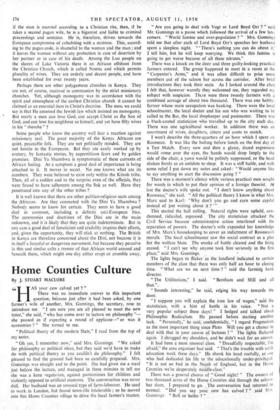Home Counties Culture
By J. STUART MACLURE
44 TAS your cow calved yet " There was no immediate answer to this important question, because just after it had been asked, by one farmer's wife of another, Mrs. Gunnings, the secretary, rose. to introduce me. " I am sure you are all pleased to meet the new tutor," she said, " who has come over to lecture on philosophy "- she paused as if expecting a round of applause--" or was it economics ? " She turned to me.
" Political theory of the modern State," I read from the top of my notes.
" Oh yes, I remember now," said Mrs. Gunnings. " We asked for philosophy or political ideas, but they said we'd have to make do with political theory as you couldn't do philosophy." I felt pleased to find the ground had been so carefully prepared. Mrs. Gunnings was straight and to the point. She had given me a meal just before the lecture, and managed in three minutes to tell me she was a keen vegetarian, against pantomimes for children and 'violently opposed to artificial manures. The conversation was never dull. Her husband was an unusual type of farm-labourer. He used to work in London, but found town-life intolerable ; so he moved into this Home Counties village to drive the local farmer's tractor. " Are you going to deal with Vogt or Lord Boyd Orr ? " said Mr. Gunnings in a pause which followed the arrival -of a few late- comers. " World famine and over-population ? " Mrs. Gunnings told me that after each of Lord Boyd Orr's speeches her husband spent a sleepless night. " There's nothing you can do about it,' I tell him, but he will keep worrying. We think this famine is going to get worse because of all these nitrates."
There was a knock on the door and three guilty-looking practical farmers entered. The group happened to meet in a room at the " Carpenter's Arms," and it was often difficult to prise some members out of the saloon bar across the corridor. After brief introductions they took their seats. As I looked around the class I felt that, however warmly they welcomed me, they regarded my subject with suspicion. There were three tweedy farmers with a combined acreage of about two thousand. There was one hobby- farmer whose main occupation was banking. There were the local schoolmaster, the local doctor and his son who was waiting to be called to the Bar, the local shopkeeper and postmaster. There was a black-coated statistician who travelled up to the city each day. There was one agricultural worker. In addition there was an assortment of wives, daughters, sisters and aunts to match.
I won't describe the three-quarters of an hour which I spent on Rousseau. It was like the batting before lunch on the first day of a Test Match. Every now and then a glassy, dazed expression would come over the eyes, the hands would drop limply to the side of the chair, a yawn Would be politely suppressed, or the head shaken firmly as an antidote to sleep. It was a stiff battle, and with some relief I put down my notes and asked : " Would anyone like to say anything to start the discussion going ? "
There was a moment's silence while various practical men sought for words in which to put their opinion of a foreign theorist. At t last the doctor's wife spoke out. " I don't know anything about Rousseau," she said. " All the political theory I know is what Mrs. Marx said to Karl: ' Why don't you go and earn some capital instead of just writing about it ? ' .
This started the ball rolling. Natural rights were upheld, con- demned, ridiculed, espoused. ,. The city statistician attacked the Civil Service because administrative action interfered with the separation of powers. The doctor's wife expanded her knowledge of Mrs. Marx's housekeeping to cover an indictment of Rousseau's morals. The local schoolmaster saw the social contract as a plea for the welfare State. The smoke of battle cleared and the firing ceased. " I can't see why anyone took him seriously in the first place," said Mrs. Gunnings.
The lights began to flicker as the landlord indicated to certain members of the class that there was only half an hour to closing time. " What are we on next time ? ". said the farming bank director.
" The Utilitarians," I said. " Bentham and Mill and all that.", " Sounds interesting," he said, edging his way towards the door.
" I suppose you will explain the iron law of wages," said the statistician, with a hint of battle in his voice. " Not a very popular subject these days! " I hedged and talked about Philosophic Radicalism. ' He paused before starting another tack. "Personally," he said, confidentially, " I regard Pragmatism as the most important thing since Plato Will you get a chance to deal with that in your course of lectures ? " The lights flickered again. I shrugged my shoulders, and he didn't wait for an answer.
It had been a most unusual Class. "Dreadfully respectable, I'm afraid," the area organiser had said. " That's the trouble with adult education work these days." He shook his head ruefully, as one who had dedicated his life to the educationally under-privileged. " It is not so bad in the North of England, but in the Home Counties we're desperately middle-class." There was a general chorus of " Good night! " The owners of two thousand acres of the Home Counties slid through the saloon- bar door. I prepared to go. The conversation had returned to normal. " Did you say your < cow has calved ? " said Mrs. Gunnings " Bull or heifer ? "


































 Previous page
Previous page